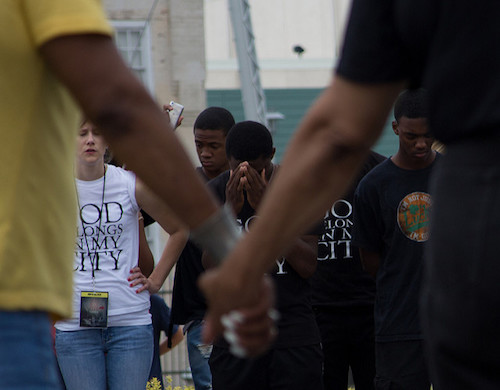We run our website the way we wished the whole internet worked: we provide high quality original content with no ads. We are funded solely by your direct support. Please consider supporting this project.

Why Racial Reconciliation Matters
In Psalm 72, the author prays for a day when “all kings” would “bow down” to God’s anointed and when “all nations” would “serve him” (vs. 11). At this time, the Psalmist continues, God’s king will deliver “the needy who cry out” and save “the afflicted who have no one to help.” He will “take pity on the weak and the needy and save the needy from death.” He will “rescue them from oppression and violence, for precious is their blood in his sight” (vss. 13-15). In other words, God’s future anointed king will do for all people what all tribal kings should have been doing all along. When this happens, the Psalmist concludes, “all nations will be blessed through [God’s anointed king]” and “the whole earth” will “be filled with his glory” (vss. 17, 19).
God made a promise to Abraham (Gen 12) to bless all the nations through him (Gen 12). This Psalm—along with many other such passages in the OT—announces that this promise is to be fulfilled in God’s future anointed king. Through him all the scattered people groups were to be ministered to. Through him all the people groups were to come to know the one true God. Through him people of every tribe, nation and language were to be brought back together.
Of course, the anointed king that this and many other passages are pointing us to is none other than Jesus Christ.
When the New Testament announces that Jesus Christ is Lord of all, it must be understood against this backdrop of the OT motif about uniting those who are divided by racial, ethnic, and national lines. Jesus Christ is not just the Lord, Savior and Messiah of the Jews: he is the Lord, Savior and Messiah of all people. In him, all the prophecies about the reunification and reconciliation of humanity will eventually find their fulfillment. For through Christ a Kingdom is being established that tears down the idolatrous tribal walls of the world and that re-unites and reconciles people together in the love God.
You can see this motif developed in Jesus’ own ministry. While Jesus’ focus was mostly on the nation of Israel, he made it abundantly clear that his ultimate mission was to transcend national and ethnic boundaries and reach the entire world. This much is evident in the counter-cultural way Jesus treated and spoke about non-Jews. And it’s evident in Jesus’ last command to his disciples: they were to go into all nations and make disciples of them (Mt 28:18).
Yet, the motif runs throughout Jesus’ ministry in more subtle ways as well. It’s implied, for example, in Jesus’ reference to “other sheep” that he had that were not “of this sheep pen” [Israel] (Jn 10:16). And it’s evident in Jesus teaching that when he is “lifted up from the earth” (crucified) he will “drive out” the “prince of this world” and “will draw all people to myself” (Jn 12:31-32). The cross that revolts against the powers of darkness also draws people by its beauty and unites them in Christ. The vision of a reunited and reconciled humanity that began with Abraham and is unfolding throughout the Old Testament is in principle fulfilled in Jesus crucifixion.
This vision of a reunified and reconciled humanity beautifully resonates throughout the entire New Testament. For example, John proclaims that Jesus died not just “for our sins…but also for the sins of the whole world” (I Jn 2:2). So too, in the Apocalypse John records the angels singing to the lamb that he is worthy “because you were slain, and with your blood you purchased for God members of every tribe and language and people and nation” (Rev. 5:9).
Paul refers to Jesus as “the second Adam” (1 Cor 15:45). As the first Adam was the founder of the first human race, so the second Adam is the founder of the new human race—the race that will finally fulfill God’s dream of having a Trinity-reflecting unified humanity. In Christ, the idolatrous division introduced by the rebellion of the first Adam shall be completely abolished. In Christ, Paul says, “[t]here is neither Jew nor Gentile…” (Gal. 3:28).
From the reading of these passages, it is clear that racial reconciliation is anything but a nice addendum to the Gospel or evidence of political correctness creeping into the church. To the contrary, the reunification and reconciliation of the scattered people groups lies at the heart of God’s program for the world. It therefore lies at the heart of the Kingdom God has unleashed into the world and thus lies at the heart of what we’re supposed to be about!
The call to preach and pursue racial reconciliation is as important as the call to preach and pursue everything else Jesus died for. We can no more refrain from preaching reconciliation than we can refrain from preaching (say) the forgiveness of sins. And we must therefore consider anyone’s refusal to proclaim and pursue racial reconciliation to be as heretical as we would deem the refusal to proclaim and work for people being forgiven of their sins.
It really is that serious!
Photo credit: ksunderman via Visualhunt.com / CC BY
Category: General
Tags: Good News, Jesus, Kingdom Living, Kingdom of God, Racial Reconciliation, Unity
Topics: Ethical, Cultural and Political Issues
Related Reading

Was Jesus Violent in the Temple?
Many adopt the attitude depicted in the picture above, saying that Jesus used violence when he cleansed the temple. But Jesus’ stance on nonviolence is clear not only from how he responded to threatening enemies at the end of his life; it’s also strongly emphasized his teachings. We need to understand what Jesus was up…

The Wrong “Bulls-Eye”: Reflections on the “Christian Left”
As it has since the fourth century, the Church today for the most part operates with a Constantinian (“power-over”) paradigm. Because of this, most socially concerned Christians are inclined to define the Church’s mission as adjudicating between and tweaking political options “in Jesus’ name.” We accept Caesar’s definition of “power” as the ability to get…

God’s Aikido Way of Defeating Evil
Greg continues his thoughts on the atonement with this installment highlighting the way God uses the evil intentions and actions of his enemies to bring about good. And because this strategy is based in love, the demons who encountered Christ could not possibly imagine what he was up to. They ended up participating in their…

Which of the Miracles of Jesus Can Humans Do? (podcast)
Greg is asked about the miracles of Jesus, specifically which miracles do we have the potential to perform. He also gives a nod to the band Theocracy. Episode 74 http://traffic.libsyn.com/askgregboyd/Episode_0074.mp3

Responding to Driscoll’s “Is God a Pacifist?” Part I
I’m sure many of you have read Mark Driscoll’s recent blog titled “Is God a Pacifist?” in which he argues against Christian pacifism. I’ve decided to address this in a series of three posts, not because I think Driscoll’s arguments are particularly noteworthy, but because it provides me with an opportunity to make a case against what I’ve…

When the Gospel is Reduced to a Sinner’s Prayer
Jeff Clark posted an article recently entitled The Gospel of Sin Management and the Loss of Discipleship. We do violence to the gospel when we forget that we are called beyond a mere “sinner’s prayer” to a life of discipleship that imitates the life of Jesus. This might sound harsh, but it’s actually an integral…
